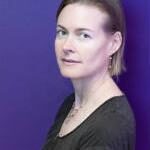Samantha Schnee: Both the title and the signature of the poem allude to a specific point in time. Can you tell us a bit about the inspiration for this poem and your creative process? Where were you when you were writing it? Were there specific moments or images that inspired you?
Jeannette L. Clariond: I was in New York City and it was March 10, according to my poetic memory. The night before I had attended Harold Bloom’s seminars: one on Shakespeare and one on North American Poetry. The morning news announced the US bombing of Baghdad. The oldest museums of the world were being destroyed. I felt sad and helpless; part of humanity’s history was being erased. I phoned a friend in Laredo and said, “Let’s get together and stop this intervention, we cannot have another war.” She replied, “We will go to church and ask God to give us light on this matter.” I understood immediately. On my flight back to Monterrey, where I live, I was reading “The Auroras of Autumn,” by Wallace Stevens, which is also a poem in ten fragments. He says poetic figures are always spiritual figures.
SS: Does your poem enter into a kind of dialogue with Stevens’ poem, or were there images, language or other aspects of that poem that inspired “March 10, NY”?
JLC: Yes “The Auroras of Autumn” is a very deep, and profoundly spiritual poem, Kabbalistic in a way. There’s a blindness very close to Milton, and very close to the whiteness of Void. Poetry is about silence, it has to do with what has not been said. They call it “creative process.” Instead, I think we are “listeners” and we are “recipients” of what art has to say. Art looks at us, and not the other way around.
SS: There are a number of abstract concepts in the poem. Would you care to elaborate on The Idea in verse 1? This seems to be a key to unlocking the poem.
JLC: The Idea of God is an abstraction. We are spiritual beings searching for light. Interior light, I mean. We are in this life to augment possible ways to be receptors of that light, which exists so that we listen to it.
Light is never a metaphor I read from Charles Wright. I feel that we should learn how “to listen” to silence. And, yes, Charles Wright is a gnostic poet. Reality is revealed to us with no intermediaries (as in the final line of my poem, realidad que no alcanzan nuestras vidas). So what we see is light transforming into Light. Through Silence, the big Silence, I mean; ir is a means of interiorization, a connection of man with the Idea, God, but not the almighty we learn about in religion class; it is the abstraction of the Idea therefore we cannot grasp it, for it is invisible, inaccessible. We arrive to that spiritual Self, through Silence, longing, and desire. You see, completeness seeks out nothingness. So, as with Morandi, we look at ourselves as emptied of meaning.
SS: Please pardon my ignorance; who is Angelina in verse 5?
JLC: A friend that lives in San Miguel Allende. It is unusual for me to address a friend in a poem. But she and I had been talking about writing and creation. We do not create. Like in the work of Morandi [an Italian painter and printmaker who specialized in still life], we need to see and feel the void of the empty jars. The silence, the absence, the distant echoes… Yes, Natura morta. Even if it is dead, or, better said, it needs to die, in order for us to start our dialogue with the dead. Poetry is a profound and spiritual dialogue with the dead. We need silence, we need void, (el vacío), we need to empty ourselves of the Self, in order to start off from scratch…. Dust=dusk= entering the night. Obscurity engenders Light.




